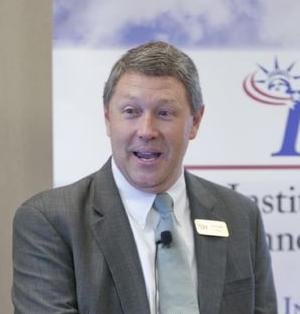
Tom Giovanetti is president of the Institute for Policy Innovation (IPI), a 38-year-old conservative, free-market public policy “think tank” based in Dallas, Texas.
In addition to his administrative and fundraising duties, Tom writes for IPI and for leading publications on a variety of policy topics including tax policy, economic growth, self-government, civil liberties and constitutional protections, judicial supremacy, intellectual property, Social Security personal accounts, technology and Internet policy, and government spending. In addition to being regularly published in major outlets including the Wall Street Journal, Washington Times, FoxNews.com and The Dallas Morning News, Tom writes often for the Fort Worth Star-Telegram. Tom frequently appears in the media and is a regular guest and occasional substitute host of the Mark Davis Show in the Dallas-Fort Worth market.
Tom loves thinking out-of-the-box to design novel solutions to policy problems and explaining complicated policy issues in ways average folks can understand.
Tom's mission at IPI is to use issues to teach conservative, free market thinking and to push back against unprincipled populism. He seeks to encourage continued skepticism of Big Government, to maintain faith in markets, and to defend individual liberty as the best means of achieving human flourishing. His most recent work has focused on free market solutions to student loan debt, preserving online freedom, and persuading state legislatures to override local and municipal rules that restrict economic liberty.
Mr. Giovanetti has represented IPI at many national and international organizations, including the World Intellectual Property Organization (WIPO), the Internet Governance Forum (IGF), and represented IPI during negotiations on the Trans-Pacific Partnership (TPP) trade agreement. Mr. Giovanetti is a popular speaker and writer and testifies before state and federal legislative committees on a variety of topics.
Follow Tom on Twitter (X) at @tgiovanetti
Testimony Before the FCC Regarding Video Franchise Reform
The New Anti-IP Bolsheviks
This is the transcript of a speech given by IPI president Tom Giovanetti on Intellectual Property (IP) at the annual Conservative Political Action Conference (CPAC) in Washington, DC Friday, February 10, 2006.
Testimony Before Indiana Senate Regarding Telecom Deregulation
Intellectual Property Rights and Human Rights
Price Indexing: The Undoing of Large Personal Retirement Accounts
Sen. Graham Turns His Back on the Conservative Cause
Sen. Graham is either unfamiliar with or willingly ignorant of this important work done by the Social Security Administration. He should spend a few hours studying it, or spend his time working on something else.
Design Principles For Strengthening Social Security Through Personal Accounts
In an attempt to bring clarity and guidance to the debate, the Institute for Policy Innovation (IPI) submits these Design Principles for Social Security reform.
Social Security Personal Savings and Prosperity
The Social Security System: A Catastropic Problem, A Transforming Solution
This is the PowerPoint presentation given by IPI president Tom Giovanetti on 9/20/2003 at Congressman Pete Sessions' town hall meeting on Social Security. Click on the link at top right that says "Full Text".
Equity Towards Excellence: A Proposed Framework for Funding Public Education in Texas
Texas has an education problem, not just an education-funding problem. The current “Robin Hood” school finance system is but one fact of Texas’ education problem.


